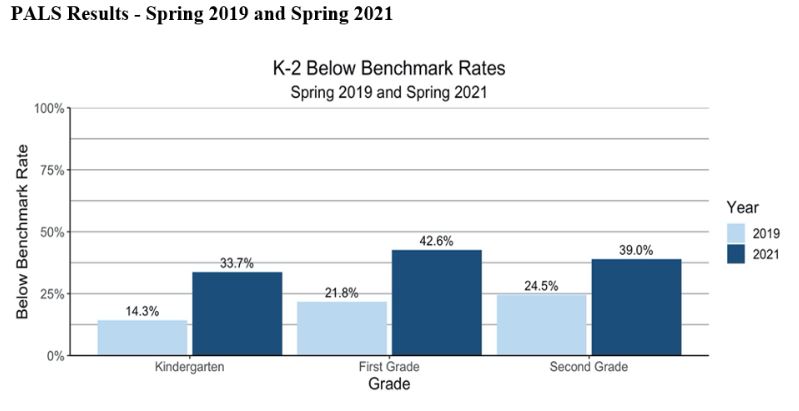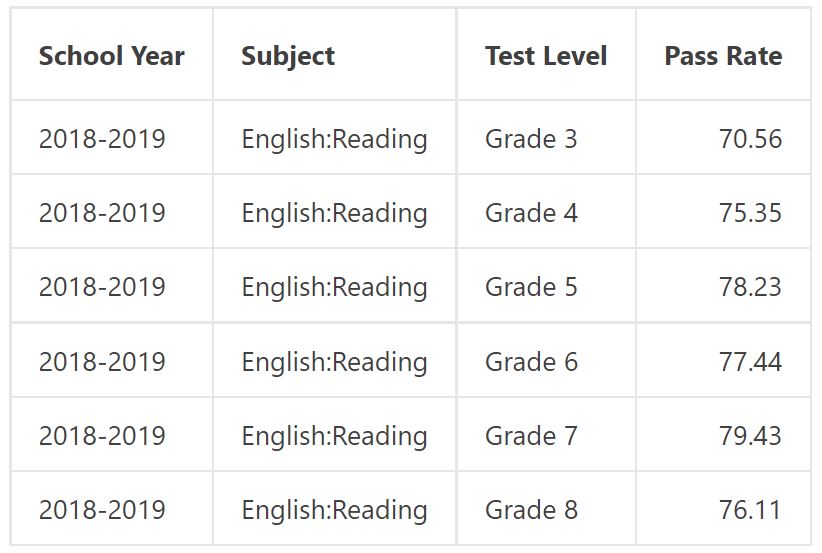
James A. Bacon
A remarkable euphemism has entered the lexicon of Virginia’s educational bureaucracy — “unfinished learning.” Unfinished learning is what you get when school children do not demonstrate grade-level proficiency in reading, math, and other subjects by the end of the year. Ever sensitive to tender psyches, Virginia educators don’t want to tell anyone they “failed.” Using the “F” word puts the onus on individual students to do better. Saying instead that students are unfinished learners places the onus on schools to remedy their deficiencies. That distinction goes to the heart of Virginia’s modern-day educational philosophy.
Be that as it may, we may be thankful that the Virginia Board of Education’s (VBOE’s) “2021 Annual Report on the Condition and Needs of Public Schools in Virginia,” does acknowledge that “unfinished learning” is a significant issue. As shown in the graph above, which compares end-of-year reading proficiency as measured by the PALS K-3 screening tool, the percentage of students who are “at risk” for reading proficiency in kindergarten, 1st grade and 2nd grade roughly doubled between the pre-pandemic year of 2019 and the pandemic year of 2021.
The COVID-era collapse in learning cuts across all demographic groups — Blacks, Whites, Hispanics, economically disadvantaged, not economically disadvantaged, English learners, not English learners, and students with disabilities. Even Asians saw a decline (although it was the least marked of all groups measured).
Two important points to bear in mind. First, “unfinished learning” was a significant issue before the COVID-19 pandemic. Second, the precipitating factor for the decline during the pandemic was not “COVID,” it was the political response to COVID. Virginia saw one of the most widespread shutdowns of in-person learning of any state in the country — a point that the VBOE pointedly does not discuss.
It is a truism that if students fail to master grade-level skills in, say, 2nd grade, they will find it even harder to keep up in 3rd grade. VBOE officials have rightly identified the early grades as “foundational,” and have targeted resources to ensure better performance.
Sadly, that effort does not appear to have had any discernible effect. Remarkably, the English reading pass rate for Virginia 3rd graders (70.6%) in 2018-19 (the last pre-COVID year) was lower than for 4th graders, which in turn was lower than for 5th graders. Here are the Standards of Learning (SOL) pass rates for all Virginia students, according to data from the Virginia Department of Education (VDOE) Build-a-Table.
How do we explain the significant improvement in grades 4 and 5? I cannot say, but I doubt it reflects a sudden and massive improvement in the quality of instruction seen in those two grades and none other.
Predictably, the VBOE report concludes that “strategies” to raise grade-level proficiency in reading require more money and more social justice. Specifically, that means recruiting and retaining high-quality teachers, equipping educators to deal with an increasingly diverse student population, and more funding for reading programs for at-risk students.
Remarkably, the Conditions and Needs report makes no reference to the widespread practice of “social promotion.” Not one. The phrase does not appear in the report. One would think that if two out of five Virginia school children are experiencing significant “unfinished learning,” one might examine the wisdom of advancing them to the next grade. But, no.
Once upon a time, schools had a thing called “summer school.” Perhaps some still do.
The VBOE report does not mention summer school either, except tangentially in an appendix describing the Standards of Quality. That document says that school districts shall require students failing their SOLs to take “special programs of prevention, intervention or remediation, which may include attendance in public summer school programs.” The main body of the report provides no data on the number of students who actually do participate in these remediation programs, and I can find no indication on the VDOE website that the state tracks this number. (Nor, for that matter, does VDOE track the number of children who are socially promoted.)
I’ve heard that by the time students reach high school, teachers are under intense administrative pressure to give passing grades. Indeed, in at least one major Virginia school district, teachers are not allowed to give zeros to children who fail to take tests or hand in assignments. For purposes of calculating final grades, the minimum score for homework assignments and tests is 55.
There is a whole lot of “unfinished learning” going on, and the VBOE’s discussion of it is remarkably superficial. Virginia’s school children deserve better.


Leave a Reply
You must be logged in to post a comment.